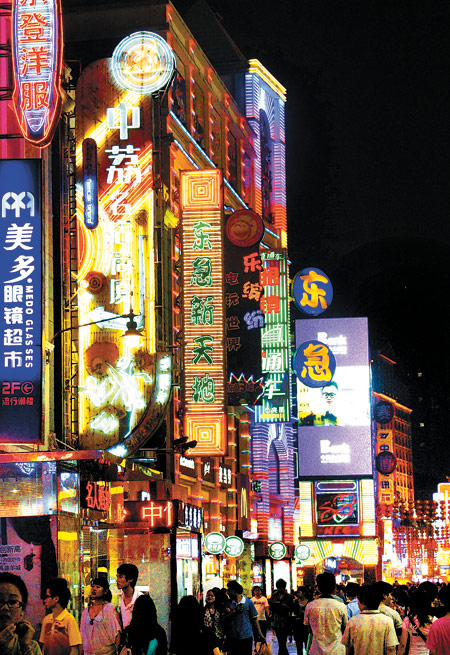A place where billboards create landscapes
Updated: 2012-10-11 13:29
By Raymond Zhou (China Daily)
|
|||||||||||
 |
|
Colorful advertisement billboards make the night in Guangzhou even more vibrant. Provided to China Daily |
The very first impression I had of Guangzhou was of the chockablock billboards that lined up the road leading from the old railway station.
At a time when most of urban China was blanketed in drabness, the density of advertising here must have been a huge shock.
"It looked just a Western metropolis," I, who had never been out of my own province, told my classmates, in 1982, after my first trip to Guangzhou for the interview for my graduate exam.
Related: Give me shelter
In those early years of reform, Guangzhou was a beacon of commercial vitality.
Goods were plenty, and stores were filled with shoppers, many from northern parts of the country.
It was not exactly like the current waves of mainlanders who flock to Hong Kong on shopping sprees.
Even though it did not require a special permit to travel from Zhejiang province, for example, to Guangzhou, the train ride was excruciatingly long and expensive, measured by the average income of that era.
As the train was pulling into the Guangzhou station, it was palpable that I was arriving in a different place.
The walls were increasingly painted with commercial messages.
But the street outside the station was a sight to marvel for a youngster accustomed to empty store shelves. The billboards were huge and colorful, and they touted gadgets that seemed out of reach to people like me.
While the rest of the country was agonizing over the ideological nature of private business, Guangzhou - actually, the Pearl River Delta in general - did not show any qualms about it.
Cantonese simply embraced it. Self-promotion has always been natural to them. You can almost say it is in their genetic code.
Even in the most draconian age, the 1960s, Guangzhou newspapers dared to carry advertisements, albeit for innocuous merchandise such as stationeries and politicized products like movies.
In 1979, Guangzhou broadcast a pure commercial message on its radio station, a first for the country in the post-"cultural revolution" (1966-76) era.
It was for a foreign watch brand, and it was in the local Cantonese dialect. It was catchy and miles from the pompous political slogans of yore.
The first newspaper ad was also for a foreign watch, albeit a different brand. It appeared on Southern Daily, the Party propaganda organ, which was the most circulated paper of the day in the province.
Due to the proximity to - and influence from - Hong Kong, many brands from the Pearl River Delta were among the first to use advertising to launch from Guangzhou into the national market.
In 1990, Guangzhou raked in a total advertising revenue of 225 million yuan ($36 million), the highest for a provincial capital.
The year 1993 became a watershed for the advertising industry, with the emergence of private firms as a force to be reckoned with. The monopoly of state ownership became a thing of the past. Some of the companies that grew out of that crop have grown to be the strongest in the country.
Guangzhou also has the nation's most vibrant print media, and behind its success lies one of the most solid advertising businesses in the country. The thickness of many of the newspapers is the envy of peers up north.
I still gawk at posters and billboards when I'm in Guangzhou. They display a sensibility different from those seen elsewhere in the country.
Maybe it's the dialectic words that add a local flavor. But, subconsciously, they epitomize the spirit of the freewheeling city and its commerce-loving people.
Related Stories
Cycling in Guangzhou brings surprises 2012-05-02 15:15
Guangzhou gets strict on bilingual street signs 2012-04-20 12:16
Today's Top News
President Xi confident in recovery from quake
H7N9 update: 104 cases, 21 deaths
Telecom workers restore links
Coal mine blast kills 18 in Jilin
Intl scholarship puts China on the map
More bird flu patients discharged
Gold loses sheen, but still a safe bet
US 'turns blind eye to human rights'
Hot Topics
Lunar probe , China growth forecasts, Emission rules get tougher, China seen through 'colored lens', International board,
Editor's Picks

|

|

|

|

|

|





